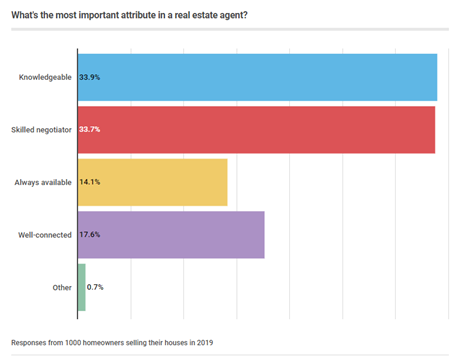A career in real estate can be very lucrative – so much so that approximately 17,000 people in the U.S. look up “how to become a real estate agent” on Google every month. 1
What does a real estate agent do?
Real estate agents are licensed to help people buy, sell, rent homes, land, and other properties. Real estate agents can work with residential and commercial properties depending on their specialty. Agents can also practice with a particular focus, like a listing or buyer’s agent and a rental agent. 2

Graphic courtesy of RealEstateWitch.com 3
Different real estate occupations
Different types of real estate occupations might sound similar yet have differing roles. For example, although they are used interchangeably, there is a difference between real estate agents and realtors.
Real estate agent vs. REALTOR®
A REALTOR® is a real estate agent who has taken the next step in their career and joined the National Association of Realtors (NAR). Founded in 1908, the NAR is the largest trade association in the United States. Active real estate agents who would like to join the organization must have a valid real estate license and an immaculate professional conduct record. Real estate agents are incentivized to participate due to its good reputation, attracting more clients. 4
REALTORS® must abide by specific standards of ethics and morals, which allows those using a realtor to feel more confident about their decision. The National Association of Realtors created the Code of Ethics as an enforceable set of ethical guidelines that realtors must uphold and are strictly enforced by real estate boards. It states realtors’ duties to clients and customers, the public, and other realtors, which are more limiting than state guidelines.

National Association of Realtors: Code of Ethics
The Code of Ethics comprises 17 articles covering different areas of professional standards of practice that must be upheld. The following are summaries of the ethical duties realtors promise to abide by:5
- Promote their clients’ interests before their own and treat all parties involved honestly.
- Avoid exaggerating, misrepresenting, or withholding facts about the property or transaction within the scope of their real estate license.
- Cooperate with other brokers when it is in their client’s best interest.
- Disclose with their client if they work with another member of their existing client’s family.
- Avoid providing professional services regarding a property they have an interest in unless it is disclosed to the client.
- Receive the client’s consent and knowledge before accepting any form of payment or commission.
- Disclose to all parties and receive consent from their client if a payment is to be received from more than one party involved in a transaction.
- Keep personal funds and clients’ funds separated.
- Ensure all agreements are clearly and understandably communicated between all parties involved in a transaction, and that each party receives a copy of each agreement.
- Refrain from discriminating against any person based on race, color, religion, sex, handicap, familial status, national origin, sexual orientation, or gender identity.
- Competently abide by standards of practice in their real estate discipline and do not provide services they are unqualified for.
- Remain truthful in their advertising and marketing materials.
- Do not practice law if they are not authorized to do so.
- Present all evidence and cooperate if charged with unethical practice.
- Refrain from making false or misleading statements about other real estate professionals.
- Do not interfere in another realtor’s contractual relationships.
- Handle disputes with other realtors through arbitration instead of litigation.
Benefits of being a REALTOR®
There are a lot of benefits to joining the National Association of Relators. For example, REALTORS® have access to property listings that entry-level real estate agents won’t have access to, particularly properties listed on the Multiple Listing Service.
Since REALTORS® can access more properties, they have more potential in the markets and can often find homes and properties that others can’t access. This makes it easier for them to give their clients the absolute best that the real estate market has to offer. In order to move on from being an entry-level real estate agent and then become a realtor, agents must take additional courses and a licensing exam – usually after working as a real estate agent for a set period of time.
According to the National Association of Realtors, about half of all real estate agents in the United States are certified REALTORS®. Many real estate agents choose this path because the organization actively works to protect its members’ interests. The NAR has strong bargaining power in both state and federal governments as a trade association. 6
Real estate agent vs. broker
Real estate agents and real estate brokers are other examples of titles that sound similar but differ in roles and responsibilities. A real estate broker can also be a real estate agent, but a real estate agent cannot be a real estate broker.
Brokers are types of real estate agents who have gone even further – obtaining higher levels of education in the field and gaining years of experience. Every state has its own unique requirements to become a broker, but it usually involves spending time working as a real estate agent before continuing education and taking the licensure exam.
Once they obtain their brokerage license, brokers are generally the types of real estate agents who own real estate firms. They’ll then have real estate agents that work for them, earning a percentage of every sale that each agent completes on their behalf.
A real estate agent can’t work independently; they must work for an employing broker. Brokers are responsible for their real estate agents’ actions. 7
How do real estate agents get paid?
Most real estate agents are paid on commission. This means that they earn a percentage of the overall sales price for each home that they represent. The exact rate can vary by location, brokerage, the agent’s role, and the terms specified in their contract.
When your listing agent charges 5-6% of the sale price of your house, you might think they’re getting a big payday. However, real estate agents take home a lot less at the end of each sale — typically 1.5%. So, for a $250,000 home, an agent takes home approximately $3,750.
Since home sales generally involve two agents — one representing the buyer and one representing the seller — the seller’s agent charges the full commission and then splits it with the buyer’s agent. The agents don’t keep all of their commission, either — they each split it with their broker. 8
Understanding all of these factors is an important part of the real estate license exam and a real estate agent’s job.
How much do real estate agents make?
Real estate agent income varies by experience level and location. First, you’ll need to know how many houses you can expect to sell per year. According to Zillow:
- A beginning real estate agent will sell 1-3 homes per year.
- An intermediate real estate agent will sell 5-10 homes per year.
- An experienced real estate agent will sell 11-14 homes per year.
- An advanced real estate agent will sell 15 or more homes per year. 9
Once you have that number, you can figure out your average real estate agent income per sale in your market. In 2019, the average home price in Seattle, WA, was $726,500, while the average home price in Dallas, TX, was only $250,000.
Steps to become a real estate agent
Since there is no national real estate license, it’s up to each state to determine its own requirements. To become a real estate agent, professionals must pass a state examination after taking the required coursework. Although licensing requirements vary by state, the average real estate agent will have completed 30 to 90 hours of coursework and must become knowledgeable about local, state, and national real estate laws and practices. Depending on the state, agents are often required to continue their education and renew their licenses every one to two years.
Example: Florida Real Estate License
In order to become a licensed real estate agent in the state of Florida, 10 you must:
- Be at least 18 years old.
- Have a high school diploma or GED.
- Complete the 63 hours of required pre-licensing education.
- Take and pass the Florida real estate license exam.
- Submit to a background check.
- Submit the application for license and associated fees to the Florida Department of Business and Professional Regulation.
- Find a sponsoring brokerage to work under.
- Successfully complete a 45-hour post-licensing course before your initial sales license expires.
Example: California Real Estate License
In order to become a licensed real estate agent in the state of California, 11 you must:
- Be at least 18 years old.
- Have a high school diploma or GED.
- Complete the 135 hours of required pre-licensing education.
- Take and pass the California real estate license exam.
- Submit to a background check.
- Submit an application for license and associated fees to the California Department of Real Estate.
- Find a sponsoring brokerage to work under.
- Successfully complete 45 hours of California Department of Real Estate approved continuing education courses every four years.
Real estate license reciprocity
Real estate license reciprocity 12 is an agreement between multiple states allowing licensed real estate agents to become licensed in a different state with reduced requirements.
Reciprocity is state-specific, so the rules and requirements for reciprocity are unique in every state. However, there are generally three different types of reciprocity agreements, as follows:
- No reciprocity: States that deny reciprocity to all out-of-state licensees.
- Partial reciprocity: States that require limited education and examination for agents from only certain reciprocal states.
- Full reciprocity: States that allow you to transfer your real estate license from any state, typically requiring completion of the state portion of the real estate exam.
Alabama has reciprocity agreements with all 50 states but requires an additional 6 hours of pre-licensing education, and you must pass the state portion of the real estate exam.
Texas doesn’t have reciprocity agreements with any other state, so you must satisfy all Texas requirements to become licensed.
Start your career in real estate today
As a real estate agent, you get to help people during major milestones, work in an ever-changing industry and have the opportunity for high earning potential. It can be a fascinating field, but don’t forget that your income is based on sales, which means you have to SELL SELL SELL!
Sources:
- Learn the ins and outs of real estate investing for only $20 | TheHill
- Realtor Vs. Real Estate Agent: Differences & Similarties | FortuneBuilders
- The Role of the Real Estate Agent (realestatewitch.com)
- https://www.nar.realtor/
- https://www.nar.realtor/about-nar/governing-documents/the-code-of-ethics
- Realtor Vs. Real Estate Agent: Differences & Similarties | FortuneBuilders
- https://www.realtor.com/advice/buy/whats-difference-real-estate-salesperson-broker/
- How Much Do Real Estate Agents Make? (You Might Be Surprised!) (realestatewitch.com)
- How Much Do Real Estate Agents Make? | Zillow Premier Agent
- Florida – Real Estate Express
- How to Get Your California Real Estate License (fitsmallbusiness.com)
- Real Estate License Reciprocity & Portability Guide (fitsmallbusiness.com)

